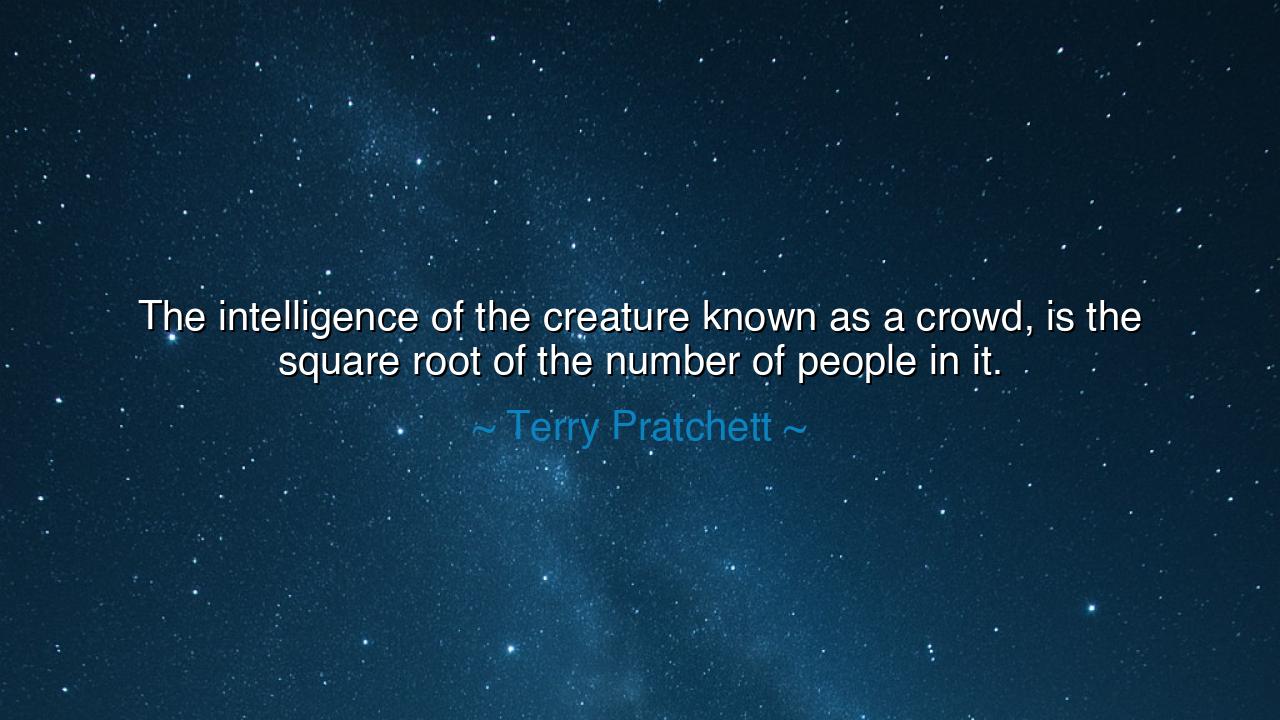
The intelligence of the creature known as a crowd, is the square
The intelligence of the creature known as a crowd, is the square root of the number of people in it.






In the sharp and satirical words of Terry Pratchett, the master storyteller who saw through both magic and mankind, we encounter a truth that cuts through the illusions of society: “The intelligence of the creature known as a crowd, is the square root of the number of people in it.” With wit that hides wisdom, Pratchett reveals a paradox of human nature — that when individuals unite without reflection, the light of reason dims instead of brightens. The more people gather into a crowd, the more they lose their individuality, and thus, their intelligence does not multiply — it diminishes.
The origin of this quote lies in Pratchett’s exploration of human behavior through satire, particularly in his Discworld novels, where fantasy mirrors the follies of reality. His worlds were filled with mobs, rulers, and revolutionaries — all blinded, at times, by the collective madness that takes hold when reason gives way to emotion. In this particular quote, Pratchett distills a hard lesson about society: the crowd, though vast in number, is often small in wisdom. It acts not with the mind of many, but with the passion of one — a passion stripped of thought and swollen with impulse.
To understand his meaning, one must see the crowd as a creature — a living being with its own heartbeat and hunger. Individually, men and women may be thoughtful, kind, and cautious. But gathered together, they can become something else: impulsive, reckless, even cruel. The square root of their number becomes a poetic equation of loss — for as more people join, the less intelligence each contributes to the whole. The individual disappears, swallowed by the roar of agreement or anger. What remains is not wisdom, but noise.
History bears witness to this truth in fire and blood. Think of ancient Rome, where the same citizens who built empires also filled the Colosseum to watch men die for sport. Think of the witch trials of Salem, where entire communities lost their reason to fear, condemning innocents in the name of virtue. Or of the French Revolution, where cries for liberty became screams for vengeance, and the mob that rose to destroy tyranny birthed new tyrants in its wake. In each case, the intelligence of individuals — reason, conscience, empathy — was devoured by the collective frenzy of the crowd.
And yet, Pratchett’s words are not simply mockery; they are warning. The crowd is not evil — it is unthinking. It is the fire that burns both wheat and chaff alike. In its unity lies power, but without consciousness, that power blinds itself. The wise understand that while unity gives strength, it must be guided by awareness and responsibility. Otherwise, what begins as shared passion ends as shared blindness. The crowd must be led by conscience, or it will lead itself into darkness.
In our own time, this lesson echoes louder than ever. Social media has given rise to digital crowds — vast, unseen assemblies of voices that move like storms across the world. They unite in outrage, in laughter, in grief — yet they can also destroy reputations and spread falsehoods with the speed of fire. The same principle holds: as the crowd grows, its intelligence shrinks unless individuals act with discernment. The ancient mob of the marketplace has merely found a new stage — and Pratchett’s warning remains unchanged: the more people think alike, the less they think at all.
Therefore, O seeker of wisdom, take this lesson into your heart: guard your mind in the midst of the crowd. Do not surrender your thought to the tide of emotion, nor your judgment to the comfort of belonging. Stand firm in your individuality, even when voices around you cry for conformity. Listen to others, but think for yourself. For it is not wrong to join with others — indeed, unity can achieve greatness — but unity without wisdom is destruction dressed as virtue.
And so, as Terry Pratchett teaches, remember that the crowd is powerful but not wise, vast but not deep. The intelligence of humanity does not rise with its numbers — it rises with its awareness, with its courage to remain thoughtful amid the roar. Be therefore the thinker in the crowd, the calm in the storm, the conscience among voices. For it is through individuals who remember to think that the crowd itself may one day learn to see.






AAdministratorAdministrator
Welcome, honored guests. Please leave a comment, we will respond soon